#and various other theories
Text
I love the number of fanon illegitimate and adopted children everyone foists on Obi-Wan. Korkie, Cal, Anakin, Ahsoka, Luke, Leia, literally every child he comes into contact with, and a few he doesn't, just results in a fandom kneejerk reaction of "that's a dad right there."
(Hells, we see him interact with Nuna and even if that's not his kid, the way he acts is just Pure Dad Mode. Amazing.)
IDK how Ewan McGregor managed to get literally thousands of people to look at his 33yo self (with artificial grey hairs, admittedly) and go "that's a father, right there. That's a bona fide Dad. He's got at least a few kids." but he did it. Maybe everyone--including the TCW team--looked at him holding CGI baby twins and went "oh. Oh we gotta do something with that."

You know the one. (Source: @yeahyeahyeaaah)
And like. He has no kids. Canon says he has no kids.
Yet we all* know that, deep down, that man is a dad.
* "All" is a deliberate exaggeration. This is not an objective truth or universal belief, just a very common one that I find enjoyable as heck.
#obi wan kenobi#korkie is a kenobi#and various other theories#so many fics where Obi-Wan is Cal's bio parent lmao#fandom sees a ginger and goes 'so the dad is Obi-Wan right?' it's hilarious#phoenix talks#star wars#the clone wars#sw games#id in alt
766 notes
·
View notes
Text
it’s still funny to me that some people are So opposed to the idea of multiple timelines in ST/they think it’s So farfetched as if this isn’t literally the Timeline Weirdness Show where they talk about the idea of multiple timelines and time travel every 5 seconds. Like. Saying that you don’t believe that there’s another timeline in ST is like saying that you don’t believe that there’s hobbits in LOTR
#stranger things#like even if you disagree w my personal specific theories abt said timelines#why are some people so opposed to the concept of another timeline whatsoever#this is literally the show that mentions the idea lf multiple timelines every other second#and im not talking abt people who didnt see it at first#im talking abt people who have seen all the evidence from various people#and still just. deny it. because they personally just for some reason dont think its happening
118 notes
·
View notes
Text
Pick the one that fits most please
#astarion#I've heard various versions of the above answers and some others#I won't say my theory until this ends so I dont ruin things#but lets just say I'm pretty sure I know the top 2#but I want to know which ends up more popular/if posts here reflect the thoughts of everyone including lurkers#baldurs gate 3#astarion acunin#i mean I can explain my theory over message if you really want to know early???#i may not have worded them the best but I wanted to be vague and umbrella it so i would get less other answers#but pick the one that fits most
36 notes
·
View notes
Text
I kinda wanted to share a few thoughts on why I think All for One possibly was a university professor, mostly because it’s a seemgly small thing but I think it adds interesting layers to him and possibly give us an idea on how his rise to power might have been so… here we go ^^’
1- The place where his last battle with the 2nd OFA user took place

Now, this was the detail about him that first set off this whole speculation train of though: as it was pointed out by @nakamafor on twitter isn’t any random place but rather the University of Tokyo.

Despite most of it being destroyed we can still make out that the walls of the Takeda Auditorium behind them, and the buildings around are also set in the same layout as the University of Tokyo
(kinda like they also noticed that the place being bombed for having people who oppose AFO also seems to be a irl place)
Now it seems that a lot of detail was included to this brief panel, true, but is it enough to conclude that AFO has any connection to this place? Was it just a coincidence that the battle took place in here?
2- Sensei
One of the most defining things about AFO that we know of is that he plays a role of a mentor, an autority, a Teacher. This was ever since his introduction, before we even knew about his connection to the noumus or to One for All
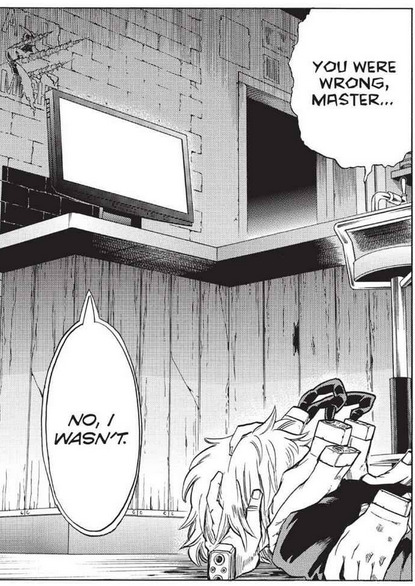
.
Also it is not unsual for him to go on long spiels and infodumping, it’s the role he seems most confortable with
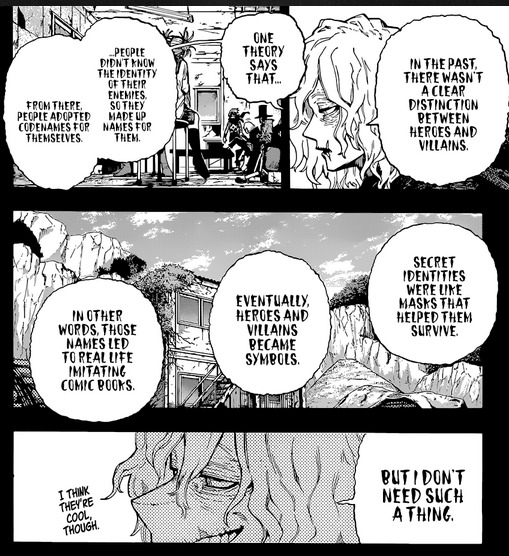
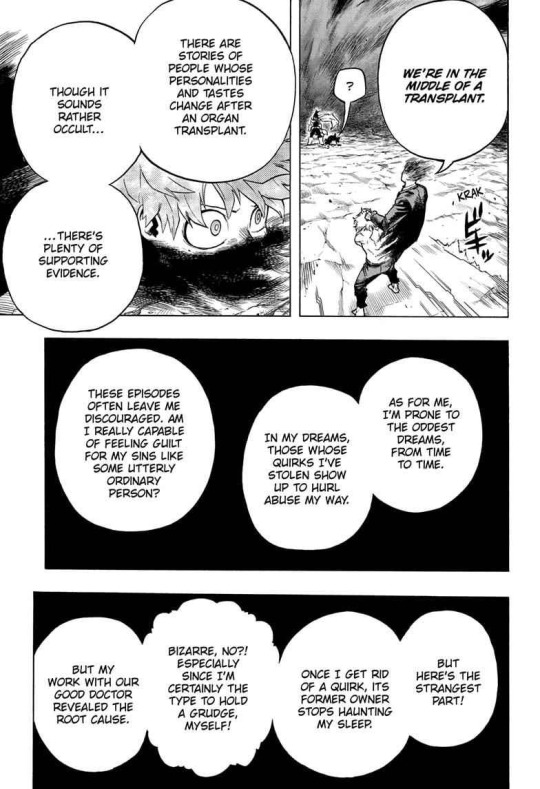
3 - Ujiko
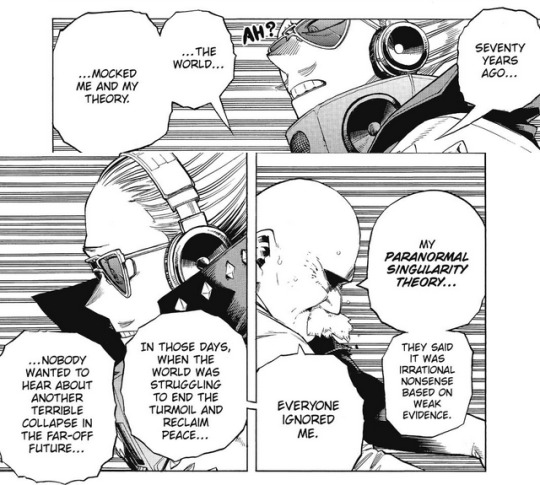
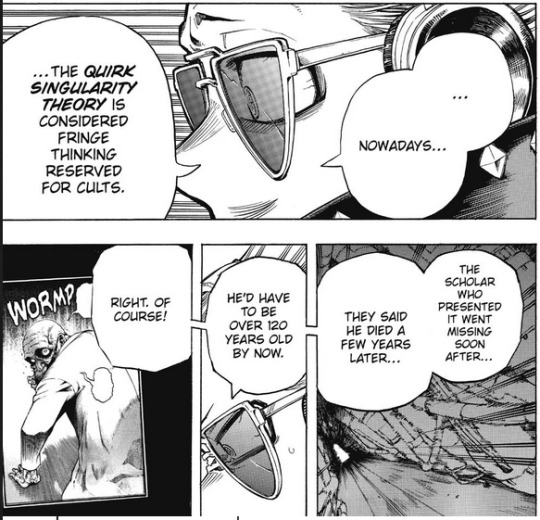
Ujiko’s backstory and the key event that brought him and AFO together was the article he released about the Quirk Doomsday theory, where he was the one to first speculate about the possibility that, as quirk evolves, they could reach a sincularity where there would be no way for control them or wield them in any way
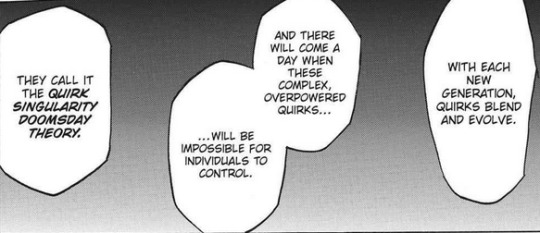
Notably amoung his circle of academics he was widely rejected and the theory was met with disdain with everyone other than AFO. This was Ujiko’s side but what about AFO?
If anything this fact seems to demonstrate that AFO is acquainted with academic circles, and he paid close attention to studies regarding quirks. So it wouldn’t be a surprise if he belonged to theses spaces as a member, possibly as a professor.
4 - Boku
Now, we know that throughout the manga AFO and Izuku share many similarities and have many parallels.
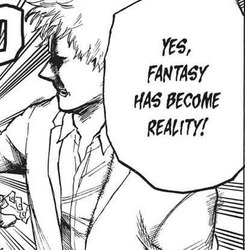
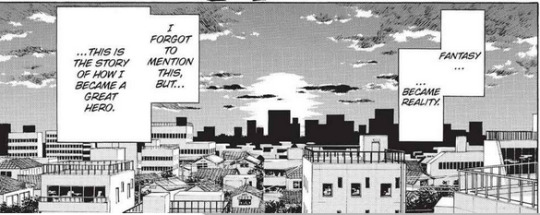
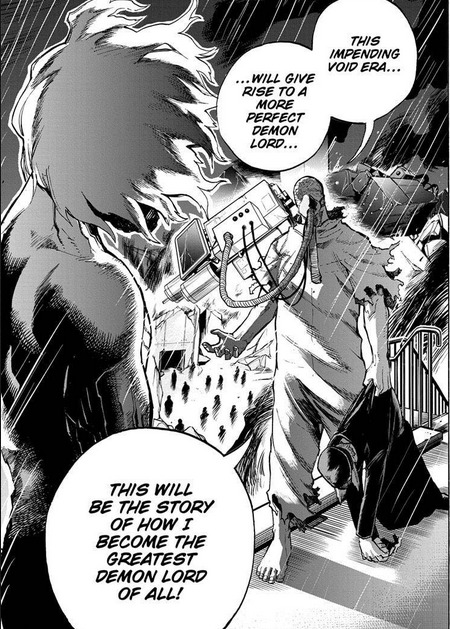
Most notable is their affinity with quirks and using them by creating a combination
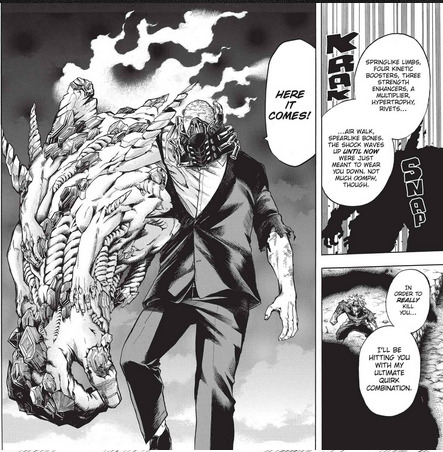
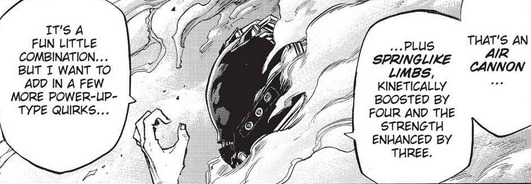
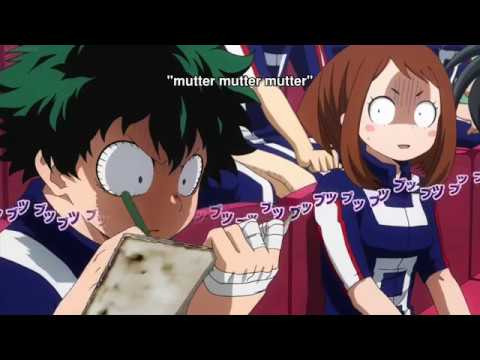
One of those similarities is that they both, in the japanese version use “boku” to refer to themselves in the first person. Which mean that “my hero academia” could apply to both of them, this story could be the one of the rise of the OFA user or the story of the greatest viilain, All for one.
In a way, this specific parallel is a mean to tie the plot, both how things started and how they will end. In one academy, rose of the Greatest villain, from another academy (UA) the greatest Hero of All time will rise along the people he saved and inspired, in order to defeat this Villain.
#bnha#bnha theory#bnha spoilers#one for all#all for one#izuku midoriya#I was trying to organize my thoughts for a while so sorry for the delay ^^'#this theory isn't mine it was built over through various twitter contributions#but I wanted to share some of it with other fans#mha#mha theory#ofa#afo
62 notes
·
View notes
Text
if i finish writing my fic about chilchuck teaching marcille to knit it'll be over for you guys
#pickle pontificates#think about it. i found another extra that references magic warmups btw#that one had hair braiding meditation and hand gestures#but think about it. are knitting/crochet/various other needle arts not very repetitive meditative things???#wouldn't knitting be a great method of magic warmups in place of hair braiding???#marcille uses her hair for magic a couple times and it could be that it has inherently magical properties#but my theory is that hers is imbued with magic because she uses it for warmups all the time#so then it could follow that the resulting knitted items would be imbued with magical properties... dungeon rabbit resistant scarf anyone?#or a fireproof sweater?#why is chilchuck my chosen victim for the person to teach her? well. on my conspiracy wall over here you can see that chilchuck frequently#sits down to sew his clothes/equipment back together throughout canon. i think it's safe to say that he's canonically good at sewing#the only other characters who we see demonstrate similar abilities are mrs. tansu who is a beast at knitting and an icon#and falin. who carries sewing supplies in her equipment (smart) but has frankly atrocious stitching#as can be seen in the comic where she and laios offer to help put marcille's name on her stuff and it's illegible#mrs. tansu really has no relation to marcille#and although falin's bad sewing may have been due to her eyesight (which would no longer affect that) she is canonically also a bad teacher#i think she would try enthusiastically but i do not see it working out#so chilchuck it is.#a fic based around these concepts allows me to further these agendas:#marcille recovering from dungeon lord shenanigans with the help of her friends agenda#chilchuck engaging in reluctant dadly activities agenda#needle arts chilchuck agenda#and... the special bonus i would like to get to... chilchuck reuniting with his wife agenda#and wingman marcille agenda#AND contributing to the dunmeshi platonic fic agenda??? so many wins#there.#now all i gotta do is finish writing it. which is an issue because i have two school assignments due yesterday
16 notes
·
View notes
Text

One of the things I love about Roxy being raised by carapacians, is that these carapacians quite possibly spoke alternian (since they served The Condesce, and she was obsessed with recreating Alternia, so she surely tried to make troll language the official language of the whole planet) and english (because surely a large part of the surviving human population never assimilated the new language, so the carapacians also had to use english to talk to humans and learn how to use many human tools scattered all over the planet).
...so, it is very possible that Roxy knows how to speak both languages too (and maybe a bit of some ancient carapacian language, sometimes used when they are not talking to another species).
I imagine Roxy as someone who "speaks average english and suddenly starts mixing up some alien words and making weird troll noises." Maybe the carapacians focused on educating her mainly using english because they knew she is human ("small human = human language = many humans use english")... but a child absorbs everything that is normal in their environment, so I can imagine Roxy learning all those "weird words and sounds" too and their meanings.
So yeah... while Dirk grew up alone and therefore it is difficult for him to speak and understand others through speech, Roxy can perfectly understand others (including trolls) but sometimes it's hard to understand her due to the occasional mix of languages and accents (also, troll language must sound incredibly wrong with human vocal cords).
Quite possibly in her teens (thanks to chat conversations with Jake and Jane) her mind focused better on english as her main one, but I can imagine her mixing stuff when she's anxious, excited, or just happy (and I also imagine Roxy as someone who tends to speak VERY fast, so it is probably very difficult to communicate with her face to face).
#homestuck#headcanon#roxy lalonde#dirk strider#carapacians#language#sorry I know there have been several hc about language / ways of speaking (or not speaking) of various characters in a row#but I love to think theories about these details#taking into account my headcanons about dirk and now about roxy... they need text messages / chat A LOT to talk to each other
123 notes
·
View notes
Text
#tolkien#a tolkien tag#my polls#headcanon survey#personally my current theory is it was developed in Tirion during the First Age#possibly accompanied by a new alphabet#before that things were too slow-paced#and Middle-earth lacked resources#present day it's common throughout Eldamar#especially with Noldor but others too#lindon and eregion had presses#Imladris probably has a small press#silvans and some Sindar aren't big fans#they don't write a lot anyway#guessing the dwarves developed it independently but don't use it much#Númenor I think had at least presses with engraving and maybe movable type#but Men aren't using it by the late Third Age#fell out of use between various wars and disasters and demographic collapses#possibly in the shire? they do have a lot of books!#Sauron stamped it out where possible#unsolicited fandom opinions#reckless application of spackle
7 notes
·
View notes
Text
Fun fact abt the Roller Club au: Momma, Poppa, and Belle (the sleeping car Belle) are all aroace. Killerwatt is also aroace btw.
#starlight express#stex#starlight express au#my au#Starlight Roller Club au#they became besties as teens and people kept assuming one was dating the other in various combos#and they just let people have theories while cackling abt them in private because none of them want anything to do with romance or sex.#they're literally just on this earth to be best friends and have fun
8 notes
·
View notes
Text
*it implies that Hawke is alive, if Hawke died in the Fade, Anders's cameo would be likely as a standalone character who only might mention his deceased partner? At least that is how I see it.
I am talking strictly about a cameo, not a mention from Hawke/someone else from Dragon Age II because that is too likely.
#dragon age#dragon age anders#anders#my heart says yes but the mind says no#anders is one of my favourite characters in the series so it would be nice to see him again#he is my favourite not because he is likeable but in theory he is a complex character (even if writing doesn't do him justice; pun intended#he is likely dead in various saves across the players so bioware might see it as pointless to bring him back#and he is a highly controversial character so bioware might find it risky to bring him back#on the other hand there are still various angles why he would show up#he still might be somehow engaged with the mages#and he is still technically a grey warden#and if hawke is anders partner it makes even more sense for anders to be with him
20 notes
·
View notes
Text
Hey can someone like grip me by my shoulders and rattle me vigorously until my brain starts being reasonable again? I’m having creative impulses twenty minutes before my night class and I got shit to do for school this week
#kazoo noises#i Will Not Acquire Books On Horror Theory And Make Sports Web Weaves#I Will Not Diagnose F1 Drivers As Various Archetypes In Horror Media#Final Girl George Russell Cannot Hurt Me. Final Girl George Russell Is Not Real And I Do Not Have The Time To Change That#pointing to myself in the mirror and being like#you WILL NOT be making posts about Logan sargeant where the caption is lifted from men women and chainsaws or the other books you’ve read#you WILL be normal about this#Anyway this is a cry for help to the sports mutuals#the horrors (zoomies)#gonna just add these tags....for future purposes
2 notes
·
View notes
Text
is it practical in combat? no.
does it look sick and cool as heck? yes.
can I draw this again with relative ease? yes.
those are my Spider-Man villain design rules.
if all the characters look prepared for militaristic combat then what is the point? there's no pizzazz, no flair, no FLAVOR. :(
gotta make the characters look COOL. make them REALLY fit their overall aesthetic and theming!!
this goes for like.. any other superhero type of media, too.
#ghostie mumbles#I always look around for designs others have made as well as various other designs that already exist within the source material--#--looking for the designs that have an element or more that I really like and I work from there. cherry picking what I like--#--and putting it all into one character design! yeah you could try putting them all into 1 unified style.. but where's the fun in that?#if I want someone to look like they came out of the decora kei scene and stand next to the world's most 'u!s!a! military patriot'--#--soldier and a stereotypical traditional romantic goth type character... I will. they clash and that makes it fun#you CAN harmonize things tho so it doesn't clash so egregiously. that's all about color theory and other stuff tho
16 notes
·
View notes
Text
I think that the best way to beat any organizations grunts (Team Rocket, Team Galactic, etc.) is to just punch them
I think that the world would be so focused on Pokemon battles as a way to gain and hold power that physical fighting is usually for dedicated trainers (not grunts) who want to grow with their pokemon, or fighting type trainers.
Self defense classes would fall out of popularity for non-league trainers and personnel because of how popular pokemon are, and how easy it is to access them. So throwing a punch at a grunt? They'd be too distracted to actually call moves, and your pokemon can destroy theirs.
#pokemon#pokemon theory#gym leaders#pokemon league#team rocket#and various other organizations#i'm just saying
3 notes
·
View notes
Note
Loving the deltarune art recently. I barely know anything about the game but it's still fun to see
TY!!!! im glad you're enjoying it even if ur not familiar with deltarune. its one of those interests where it never really goes away and any time i see anything related to it i go into a spiral of obsessing over it for a bit (when there's no new content) but for some reason its um. stayed this time LOL. i have no idea. im sure it'll eventually fizzle out soon like usual unless the next chapters' release date is magically announced or smthn. but yes im having fun ^_^
#never rlly drew much deltarune stuff when fixated on it before so its been fun trying to learn how i wanna draw the characters#not art#asks#but yeah oooh its bad folks. havent done anything but rewatch theory/analysis videos havent listened to anything other than the ost and#various remixes of the ost. havent been drawing anything besides dr
10 notes
·
View notes
Text
i do think being ndn, and specifically being ndn learning more about history, has really impacted how i approach my writing. i mostly write fanfic but like. when I do, I ask, how can i incorporate Indigenous peoples & themes in this fictional setting.
like. story not set on our world or with earth world cultures? ok! what are the relationships between different peoples in this world? looking at all borders on the map and trying to create a history for why they were chosen, asking how that was “decided," imagining all the peoples who were split from drawing that border. or what about shared cultures that split for civil war, and never reunited? stuff like that.
who were the people whose lands got included under those borders, even if they were a separate people? did the borders use to be fluid and overlapping, with seasonal nomadic patterns, until permanent settlements and printed maps forced uniformity?
idk i feel like it adds depth to the world as well as a context to create original characters in, too. i think its good for me because otherwise there are very few Indigenous characters that are in my fandoms, but i do think it’s really helped me frame my approach to worldbuilding/development in my writing, for better and for worse.
#even nonIndigenous ppls i just like to incorporate various idk. peoples#but I think i got this approach from thinking critically about *how* i could insert Native characters#i could go on a multi page rant abt how decolonial theory has impacted me & my writing too#to be the other is to be made-killable is to be made a future-ghost#into a story that doesnt linger on Indigenous themes#just rambling idk. some thoughts while i eat my lunch and take my break
1 note
·
View note
Text
transcribed some parts of this fun & informative podcast interview of will roland’s that i thought were especially so, but also the entire thing is great so feel free to check it out in full via the link in the source:
(re: The Panic of ‘29)
Charles: When you're working on a play like this that's set in a very specific period, how do you sort of do research, and were there any specific people that you based this character on, or...?
Will: Um, y'know, the character is, uh—is loosely based on, uh, [laughs] loosely based on a character that I played in another show? I sort of imagined, uh, Jimmy to be a younger version of, um.... Every year, uh—well, not for the past few years, but for many, many years, uh, we've done, uh, with Joe Iconis, we've done, uh, a big Christmas Extravaganza. Uh, and one of the recurring characters in that, uh, is a character named [in Mr. Macabee voice] Mr. Macabee, the old-timey barkeep! [drops voice] And he's, uh, y'know, he's a sort of mystical barkeep, uh—uh, who sort of serves as a—a spirit guide in that show, and I thought, like, "Oh, I wonder if Jimmy is like—if a young Jimmy Armstrong becomes a—a Mr. Macabee as—[laughing] as he gets older," um, and so, uh, it—it began sort of there...
—
(also re: The Panic of ‘29)
Charles: And have there been a lot of changes made to this play, or—or any changes since you've started with it?
Will: Um, y'know, since—since we started, uh, there have been—there have certainly been some changes? Y'know, some—some little stuff here, reacting to what actors are doing, um, y'know, they added a scene, uh, while we were in rehearsals? Um, y'know, there's, uh.... Without spoiling too much, there's a large explosion near the end of the show, and I think that, uh, one of the things that they wanted to do for clarity was they added a scene, uh, wherein we meet, uh, the people who are responsible for that explosion. That was not in it when we started.
—
Charles: And so now I would love to go all the way back to the beginning to ask you: how did you first become interested in theatre?
Will: Oh, how'd I first become interested in theatre—I think that, um, I have always had a sort of performer's streak? Um, I think, y'know, even as a little kid, uh, my family would identify sort of—I loved sort of singing and playing pretend and—and—and I was a very animated, (Charles: [laughs]) and—and—I—always a storyteller, um, I did, uh—I've always loved the film It's A Wonderful Life? Uh, it's one of my favorite movies ever, uh, and I used to do, like, a George Bailey impression when I was like, five years old. 'S a very—'s a very strange thing for a five year old [laughing] to latch on to, but I—but that was what sort of got me going, um, and then, uh, as I got a little older, um, I started doing theatre in school, y'know, in middle school, and I—and I think that...it started out as, like, 'Oh, I'll give this a try,' and then, as I did it, ah, the thing that kept me there, I think, was less, like, the theatre per se, I think it could've been an—any activity, but I was really drawn to the community, and I was really drawn to the kind of spirit of collaboration, and, uh, y'know, I think I loved being in rehearsals, and building sets, and—and—y'know, doing runs of shows; I think all of—all the people, and the social aspect really appealed to me? Um, and then as I got a little older, um, y'know, as I was starting to go to college, and—and think about where I was applying, and what I wanted to study, um...it sort of occurred to me, and I was like, 'Oh, maybe...I would like to try to be a professional actor.' Which—which is sort of a thing that had not, uh... It wasn't that I'd, like, never thought about it, but it was not, like, I wasn't, like, ten years old, being like, 'I'm gonna be on Broadway someday!' That was not my, uh, trajectory. Um...and I think that, uh, I—I have been very blessed, I—I've had a really wonderful career, um, I didn't really do anything professionally before I graduated college. I was—I was fully nose in the books, um, y'know, doing educational theatre for many, many years. Um, and—and once I graduated college, I sort of tried my hand, uh, working professionally. And—and my first job was actually, uh, here! At 59E59. So. I'm returning to the scene of the crime, as it were. [Laughs]
Charles: And when you made this decision about being a professional actor, were your parents and people around you supportive of it, or, how'd that sort of go?
Will: Yes. I'm, uh, I'm very lucky. I—I have, um, I have a group of, uh, my family especially, uh, is incredibly, incredibly supportive, has always been incredibly supportive, um, it's one of those things that, um... Everybody has their own journey through this world, and I have always sort of marvelled at folks who have done it without family support? I just don't know—personally, I don't think I—I would have the strength. (Charles: [laughs]) Because there are so many...people and forces in this—in this life, in this career, uh, who are telling you, uh, 'You can't, you shouldn't, you're not enough, you're incorrect, if you just fix this one thing, blah blah blah blah blah—' Some of them are trying to be helpful, some of them are not. But there's a lot of energy, uh, that sort of says, like...is not supportive, overtly. Um, and my parents have always been a no questions asked [laughs] unconditional support element. I could do bad work, and they will say it is good. And I think that it is, uh, I think if you're gonna embark on this kind of career, anything where you have to put yourself out there this much, um...you gotta have somebody who is just like, 'You're good!' no matter what. No feedback, no qualifiers, no...like, y'know, helpful criticism, just 'You're good! You're doing great, keep doing it,' because there will always be people who are telling you, uh, what you can fix, and—and what you can improve, um, and I'm—and I think having a group in my life that is just positivity has been a real bedrock of my progress in this life.
—
Will: My high school theatre program was a really exceptional place, run by, uh, really—really smart, wonderful people, um, who understood theatre as a tool for building community, um, which I thought was really great, uh, because they, um... Y'know, I think there are a lot of programs out there that are about, like, training young people to be professional actors? Um, I think that's really valuable, but it was not the kind of training that I needed or wanted, um, and so I'm sort of glad that I didn't, uh...I didn't have that experience. Oh my god, his name is Jimmy Powers! (Charles: Ah!) No wonder I thought it was Jimmy Armstrong, I was like—and then I went back to City of Angels. I was like, Jimmy Powers. So yeah, that was my—my first role in high school... Um, and then in college, uh, I—I got really lucky, um... Every time I tell my story about, like, how I got here, there's a lot of moments where I say, like, 'Yeah, I was really lucky!' (Charles: [laughs]) Um, I—I reflect on that luck, uh, a lot. Um, and, uh, so, a few weeks into my college experience, um, I had a professor named John Simpkins, who's a director, he runs the program at Penn State now, he's an excellent guy—um, and he brought in, uh, a frequent collaborator of his, uh, who is Joe Iconis. (Charles: Oh...) Who I have since had a very long collaboration with. And I met Joe when I was eighteen years old, y'know, six weeks into my freshman year at college, um, and I immediately fell in love with his music, um, and it was the first time in my life that I started to think about, like, 'Oh...like, when you go see a musical on Broadway...if it's not a revival, then it's a new musical! (Charles: [laughs]) And, like, someone made that musical—like, someone wrote it, and, like, all those actors that are in it, like, they...they were the first people to ever play those roles,' and I—I became immediately very, like, taken with that. Um—I—it really—and I, uh... Most of what I have done in the last ten or twelve years, uh, has been development of new musicals. So I was lucky enough to work on new musicals at NYU, um...and also do some great revivals, we did Violet, uh, we did a show called The Fix, which is, like, a weird mid-'90s Manchurian Candidate musical... Um, uh, what else did we do in college? We did Bat Boy, which is my favorite—a—all-time favorite shows, which is so, so, so great... Um...man, I'm trying to remember my—the college stuff, I have much more vivid memories of the high school shows. But a lot of the college stuff was about, uh, sort of discovering my love for new musicals. And—and—and getting to...try my hand at some development. And then...since graduating, I—I've really—that's really where a lot of my energy has gone.
—
Charles: And, so, before The Black Suits, I believe, was The Bus at 59E59—(Will: Yes!)—and, so, what was that play about, for those who...?
Will: Um, The Bus, uh, which was—which was seen by dozens of people eleven years ago, [laughs] um, uh, The Bus was a play about, uh, two young men growing up in a—a sort of nondescript, uh, Midwestern town; it's not clear if we're in Kansas or Ohio, or—but we're sort of somewhere in the heartland of America, uh, and it is basically a love story, uh, between these two adolescents.... Um, it unfortunately does end tragically, um, but one of the things that was sort of exciting about that production was that, uh, it was produced by, uh, this fella named, um, named Nate Phelps, who is the estranged son of Fred Phelps, who is the Westboro Baptist, uh, minister, so, you know, like, y'know, the—the "God hates F-words," y'know, the—(Charles: Yeah.)—notoriously loud, anti-gay church. Um, so this was produced by this estranged son who escaped from this—this cult, um, and so after we did the show at 59E59, we actually went, uh, to Topeka, uh, and we did a performance in Topeka and a performance in Wichita, um, and we were, you know, picketed by Westboro Baptists, it was very exciting, it felt like, um, it felt like—well, what was very cool was that it felt like it got to be a—a show that sort of blended some political beliefs within the show with some real-deal bonafide activism, uh, at a time when, y'know, I mean, this feels like ancient history now, uh, but like, in, y'know, in 2011, like, gay marriage was not legal in this country, and...y'know, it was—the climate was different, uh, than it is now. And so, uh, it—it felt like we were really sort of, uh...fightin' the good fight. Um, so that—that was a really wonderful experience for me. And for that to be my—my first professional job gave me a real sense of purpose and meaning, uh, in the work that I do, and in the power of my work to effect change in the world.
—
Charles: And so, to go to, um, The Black Suits, I'd love to ask: what is your collaboration like with Joe Iconis, and what makes him such a great collaborator?
Will: Um, my collaboration with Joe is hands-down my favorite artistic endeavor of my entire life. Um, I have never met a writer who understands and is so excited by all the dimensions of me, as an actor and a person; I've also never met, uh, a songwriter whose words and music I find quite as exciting as what Joe writes. I—I think Joe is simply the best musical theatre writer alive, um, that—I know it's a big statement, and—but, y'know, it's just—it's just one man's opinion. Um, I think that—I think that what Joe writes is so human; he is so interested in, uh, like, regular people, and regular experiences; he's so interested in—in portraying—in musicals that allow people to be ugly, and human, and sort of warts and all, uh, and he's interested in, uh, y'know, he always tries to fill his shows with people that look like people you might see on the street, uh, but then they sort of open their mouths and all of a sudden they're these incredibly talented actors and singers and dancers. Um, and I think that his—his fixation and his passion is a love of people, uh, and a love of language, and, uh, I think whenever I get the opportunity to see his work or read his work, um, I'm just so...uh, transported by it. Um, it feels so...relatable, and pedestrian, and normal, but also it feels—the stakes feel huge. It feels like Greek tragedy presented in, y'know, sort of regular, everyday speech.
—
(re: The Black Suits)
Will: What happened, was, uh, y'know, there's the—there's a local paper out there, the L.A. Times, Charles McNulty writes for the Times, uh, he real—he really didn't like the show at all! Um, and he wrote a really bad review, and—y'know, there were a couple, like, at—at the time sort of like, blog reviews were not...as present as they are now? And, y'know, so there was like, the L.A. Times, then there was a bunch of stuff that nobody read. Uh, and the L.A. Times hated it, and all that stuff that nobody read, uh, liked it, um, and so what ended up happening was, y'know, we had a six-week run, and every day it was, y'know, a half to two-thirds full, um, and all of those people had an incredible day at the theater. Um, and—and it was, uh, a really sort of difficult and a valuable learning experience, where I was doing this show that I loved, this role that I loved, uh, y'know, all this stuff was—and we knew it was good, because every night, people would—would lose their minds for this show! They'd leap to their feet for this—this like, weird play about, like, boys in a garage band. Um, and, y'know, and I—it—it was this sort of reminder that this—this industry [laughing] can be incredibly cruel, um, at moments, and, y'know, I sort of came back from that show, and...a—a little bit dejected, and a little bit like, oh, I've spent the last couple years of my life really thinking that this show was gonna take me to the next level, um, y'know, and it—and it did in certain ways, internally and emotionally, um, and it really prepped me for what was coming next in my life, but, uh, y'know, in that—in that time between...y'know, I came back in November of 2013 from doing The Black Suits, and then in the summer of 2014 I started working on Dear Evan Hansen, so it's like a eight-month stretch, where I was, uh, like, really, really bummed out. Um, but I think I was primed in a—in a very good way to walk into the Dear Evan Hansen process and—and really sort of, like, y'know, bring my A-game, and—and—and be grateful for what—what was happening there.
—
(re: Dear Evan Hansen)
Will: But I think what started to happen was, uh, with the group of actors that they had in the room, and with the score that Benj and Justin had written, uh, and the—and the way that Steven Levenson, in being a good writer, was really humanizing all of these people, uh, it became harder and harder to poke fun at them? Uh, and—and as time went on, the show became more interested in...like, what is grief, and what is grieving, and...what needs to be true, and what can occur with sort of false truths, and I—I think the show was really interested in saying, like, how much healing can come from a bad act? And I think that's the main question of the show, and—and I think what we see on stage is that...almost all of the characters in the show, uh, end up better off? Because of this terrible thing that Evan has done? Uh, and—and—and I—I think the show is really fascinated by, like, what—what is the harm there, and what does it mean, and—and—and how d—like, wh—uh, what does truth mean? And what does grief mean? And how do they intersect? And I—I—I think that, uh, that was the sort of biggest change, was the way that it really...embraced the healing that people feel, uh, y'know, when a celebrity dies, and they—and they write a Facebook post about it, like, th—we can sort of make fun of that, y'know, being like, "Y'know—you didn't know that celebrity," but...the parasocial relationship means something to the grieving person. And so they—y'know, Dear Evan Hansen is like, [laughing] what if you had a parasocial relationship with someone you knew, and grieved for them in that way. So, that—that was the big—the big shift.
—
(re: Dear Evan Hansen; Michael Greif)
Will: The way that he led that process, of discovering the soul and humanity of this show, and then putting it onstage in a way that was effective and efficient and—and—and really, like, uh—uh, worked for people. Because I think that...it—nowadays, you're like, "Oh, Dear Evan Hansen, it's a big hit, everybody likes it," but I think when we started doing this show it was not so obvious that this sort of...very funny, but also very touching story about this boy who does this terrible thing after this young man dies, and, it, like—we were sort of like, "Are people gonna go for this? Like, is this gonna work?" It was not, like, an obviously good idea for a musical on paper, um, and I think that, uh, Michael especially was—was the one who...knew which way to take it so that it did work, and so that people did take the ride. Um....dyeah I like him so much. He's also a good friend.
—
Will: It's humbling, and it's strange. It's the kind of thing that you don't, um.... There are many talented, successful actors and theatre makers in this world, who have long, successful careers, and never have the experience like we had on Dear Evan Hansen. It's a very strange, sort of black swan event, um, and...I think that it was, it—it—when things like that happen, it's a sort of unique combination of the show itself, and where the culture is, when the show sort of hits its maximum prominence. So, I think that, like, Dear Evan Hansen arriving on Broadway in the fall of 2016, uh, with sort of where American culture was, and where cultural conversation was, created a really specific moment for this show to sort of thrive and explode. Um, and—and I think that—I think at the end of the day, it's—it's—it's really good, it's like a really well-written, well-made, well-produced show, um, but there lots of those out there that don't hit in the way that Dear Evan Hansen did, and I think it's sort of, um.... I, personally, don't have such an ego as to say that, like, "Well, the reason Dear Evan Hansen is what it is is because it's that much better than other shows"—[laughs] that, y'know, um, and I—and I—I don't think it's that, but I think that there is a sort of zeitgeist, there is a sort of spirit, um, and—and what was sort of strange was...uh, y'know, we opened Dear Evan Hansen on Broadway in the winter of 2016, uh, and so...2017, the first sort of six months of that year leading up to the Tonys was the big...sort of time when it all blew up. That's when the album came out, and that's when I went from having, y'know, four thousand Twitter followers to having sixty thousand Twitter followers, and things like that, y'know, that all happened in, like, a six-month span. And at the same time, that was happening with two other shows. That was happening with Heathers, and that was happening with Be More Chill. Um, and—and it was really fascinating to watch the sort of, uh, way that tastes are made, and—and—and influence sort of organically passes back and forth on the internet. Because a lot—a lot of Dear Evan Hansen's success was within traditional theatre success? It's, like, a—a nice review in the New York Times, a bunch of Tony nominations, like—y'know, very traditional ways to succeed, and—and—and—and become spectacular. But it also, uh, infiltrated all of these, uh—these—it—uh, nontraditional, uh, venues. Which is—social media, uh, and all that stuff—and so it was interesting to see the nontraditional path happen for a few shows at once, while our show was also on the very traditional path, um, to being a hit. Uh, and I think that it—it—it really made me aware of...how the shows that I know about, from, say, twenty years ago, came to me through a very specific filter, of, like, did the New York Times critic like it? Did it do well at the box office that season? Did it win Tony awards? Like, these are very.... The shows that I know about, from the ‘70s and ‘80s and ‘90s, usually had those things happen to them. And it always makes me wonder about, like, what are the other shows out there that I don't know about, that I probably would love, if those people had decided they liked it.
—
Charles: And, so, as an actor yourself, how do you sort of balance the having so many followers on social media from Dear Evan Hansen and from Be More Chill with—with just, like, going about life and all that, and...?
Will: Um...I mean, I'm—I'm lucky in—insofar that I'm not, like, uh, I'm not like, famous-famous? You know what I mean? Like, I'm not, like—I can—I can walk out my door, and... (Charles: [laughs]) I can walk down the street, I'm not—I'm not, like, Beyoncé. [laughing] Um, you know, but, uh—uh—uh, it is—uh, it—it's interesting, with social media, I...uh...I—I'm, uh, I—I'm thirty-three years old, um, and I view, personally, like, everything that is on social media is a performance? Um, I think that individuals posting about their...sandwiches at—at lunch is per—is performance, and the stuff that I put out on my, uh, Twitter and Instagram is also performance, um, and—and I think that, uh, y'know, I'm—I'm a—I'm a pretty private person? Um, y'know, I—folks who've met me at the stage door know that I'm—I'm sort of, like, I dunno, I think sometimes I come off as rude, and I don't mean to, but I just sort of, like, am—I get really overwhelmed, by, uh—y'know, when—especially—especially, like, stagedoors being inside of those barricades, uh— (Charles: Oh, yeah.) Sort of—sort of makes my heart race, and—and—and gives me anxiety, and—and I—I don't, uh, I don't like that experience? I'm grateful for the people who are there, I'm grateful for their support, I'm grateful that they're, y'know, that—that they—that they want to see us, um, but it definitely is, like, com—this specific environment is, like, not for me. Um...and so I—I sort of use—I use social media as a way of sort of performing in that sphere, uh, without, uh...uh, putting myself in bodily—physical harm. (Charles: [laughs]) Um, y'know, 'cause most people are very nice! Y'know, there's a lot of nice people out there, and I have no, like...I have nothing but gratitude, um, y'know, for their support, but at the same time, like, sometimes the ways that it is shown makes me go, like, [mimics hyperventilating inhale/exhale]
—
Will: And I think that Dear Evan Hansen is a—a character study in—in grief, and in sorrow, and in truth, um, and what is true.... I think that Be More Chill is a celebration of all types of diversity; I think it is a celebration of—of different personalities, and different interests, and body types, and races, and cultures, and genders, and neurodivergent folks, and I think that it's like, the show is so, uh, it—it—it—it's.... Be More Chill is not ever telling anyone, like, "I know it's sad now, but don't worry, like, it's gonna get fixed later." (Charles: [laughs]) Be More Chill says, like, "No, this is it. And it's time to celebrate what this is." Um, and I think that the finale of the show especially—I think "Voices In My Head" is the ultimate sort of, like...everyone in the company shares their strange, eccentric truth with one another, while our protagonist acknowledges that, like, "Well, this is my lot in life. [Laughing] Um, and—and I'm gonna choose to celebrate it and choose to meet it with joy and choose to love myself, um, even—even on the hard days." Um, and I think that, uh, all of that is—is only made possible when none of the characters onstage are an archetype or a stereotype or a caricature or a device. They have to be real, complicated people.
—
Will: Making sure that, uh, we had enough moments to check in with Jeremy, our protagonist, and...learn what he's thinking about, and learn why he's doing what he's doing, and—and, uh, y'know, that's one of the things that Dear Evan Hansen does really well, is all of the song moments and all of the conversations with Connor, is, uh, that's when you learn why Evan is doing what he's doing. And so, then, I think that—not, like...nobody was talking about Dear Evan Hansen in the room, but I was sort of reflecting on that at the time, it was like, "Oh, yeah, it's good that the audience be given opportunities to meet our protagonist who is doing dumb things, (Charles: [laughs]) and learn why he's doing these dumb things."
—
Will: It was very important to me that we see him try. I was like, there's a lot of text, uh—in the score, and on the page, where Jeremy sort of complains about how nobody likes him, and how he's so uncool, and nobody understands him, and I was—I—I said to Stephen Brackett, our director, and—and to Joe—the Joes, Joe Tracz and Joe Iconis—I was like, it's so important to me, and I want you to—y'know, help me with this—that the audience see Jeremy attempt to be a part of these social circles and be rejected. Because I think if he doesn't—if we don't see him try and try and try again, then he's just like, kind of a whiner. (Charles: [laughs]) Um...and—and so I think what I—what I did was I sort of did my best to, as we went along, really internalize the way that the other characters onstage were treating me? Um, and then, I—I think...ultimately, the Jeremy that I came to was Jeremy believing all the things that people say to him in the first, y'know, half-hour of the show.
—
Charles: So, Be More Chill and Dear Evan Hansen, of course, as we discussed before, were musicals that had a lot of following on social media and all that, but, um, Dear Evan Hansen was sort of able to run for a lot longer on Broadway, and do you think that was another example of the sort of time thing, or—what do you think that was?
Will: Um... Y'know? I think the, uh, I think the—the tricky thing about, uh, that whole process, uh, was—and, y'know, I was talking before about how, uh, there—there are plenty of good musicals, but maybe they didn't get nice New York Times reviews, or Tony nominations, or—or sell a lot of tickets? Um, I think that, uh, Be More Chill was—was, uh, a moment where certain sort of gates were closed to us? And, y'know, especially by way of, like I said, like, reviews, I mean, uh...the New—the New York Times was not kind. Um, and then I—I had this experience very often, after the show, where I would meet someone, uh, y'know, normally there was a younger person, a person in their teens or twenties, they were accompanied by an adult who I perceived to be in their forties, fifties, sixties, um, and the adult would say to me, 'Oh, y'know, I really didn't think I was gonna like this, (Charles: [laughs]) I didn't think it was for me, but I had a great time!' And I would sort of ask them, as politely as I could, like, 'Why didn't you think this was for you?' Um, and—and a lot of times they would say, like, 'Oh, well, I—I read in the Times that it was for kids,' and...I—I was sort of, like, 'Well...we don't think it's for kids, and, y'know, tell your friends.' Um, and I think that, y'know, it—it was—it was a really interesting, uh, y'know, and—and then the—the Tony nominations came around and—and it sort of felt, uh, y'know, kind of cruel, the ways in which the show was not acknowledged, and it sort of felt like, uh, a small group of people, at a few moments, had really sort of, uh, acted to, uh, sort of counter the love of a very large group of people. Y'know, we had, like, hundreds of thousands of fans online whose support, uh, y'know, made this show happen, and they showed up at the theater, I mean, every night they were screaming, it was like a rock concert. Um, and...y'know, it—but, unfortunately, we weren't able to get over these sort of, uh, gates that were—that were set up for us. Um, and so I think that's what ultimately led to—I mean, y'know, the show closed because it—didn't—I—Broadway shows close because they don't sell enough tickets. (Charles: [laughs]) That's the, like, beginning, middle, and end of it, and at the end of the day, like, we were discounting too many tickets to remain open financially, and I think a lot of that had to do with, uh, y'know, the—the sort of, uh...headwinds that came at us from within the industry.
#will roland#the panic of '29#joe iconis christmas extravaganza#joe iconis#hey beautiful#(tfw my The Bus tag is not simply The Bus lol)#february 2011 nyu steinhardt players club bat boy production starring will roland#the black suits#deh#bmc#could i have transcribed more Quickly / could this be more quickly read if i was doing standard editing vs recreating every filler word?#probably. however.#i also think every interview & every part of it is fun & enjoyable including ones where the topics aren't peak relevant to whatever projects#of peak interest and/or most information isn't brand new so like. i mean i revisited this like ''yeah there's these three answers that i#can recall feeling like peak highlights to share'' and here we are. could've even thrown in one more answer segment from the v end lmao#various things included for various reasons as per my particular interests as well....panic of twenty nine gleaning lol....#i remember i'd heard Of the [the bus performance in kansas / wbc connection] but had no idea it was like the same production ft. william....#michael greif section for my theory of how he's this big missing but key element re: other adaptations lol....#like yeah there's a bunch of ppl's efforts combining organically / it's never Just The Director / lightning in a bottle factor; but....#and another Good Friend lmao; mentioned harrison chad a lifelong friend earlier lol. going around befriending ppl all over the place#and b/c of the social media filters it may not be obvious till he says so / save for being gleaned from other glimpses/remarks here & there#like presumably mike faist continues to live in william's linen closet but there's a guy choosing to be even more private/perform even less#which you know; godspeed. can only imagine even being [not Famous famous] like whew. ok i need actual categorical tags here lol#did that & then moved them to the front...the ominousness of Unfortunately [The Bus] Ended Tragically like it wasn't That bad lol#tragedy going on to be sure but then surprising turnarounds on like several fronts#always remembering one's first read through of The Bus script and hitting that point in the plot like umm. excuse me. girl help#anyways yeah the whole interview's v engaging. classic providing of informative & intriguing insights & trivia & lore.
22 notes
·
View notes
Text
hey would anyone actually be interested in a more long-form vers of my theories/interpretations/HCs for Bryan O’Brien? cuz genuinely i have like… A Whole Thing but idk if anyone cares abt the like. not even secondary/side characters but just a series of recurring cameos that i hav decided to attribute meaning n consistency to LMAO
#i think rcg are smart enough to where this could be intentional subtext but its more likely they just use friends/friends of friends#for various roles but… i do have a thing like going by dennis’ ‘’lets be consistent!’’ philosophy (of which my bryan theory has a lot to do#with actually)#where i think there could be a storyline there. my pitch basically lol#ik i could just write fanfiction but im Lazzzy n also feel like working on other stuff atm
10 notes
·
View notes